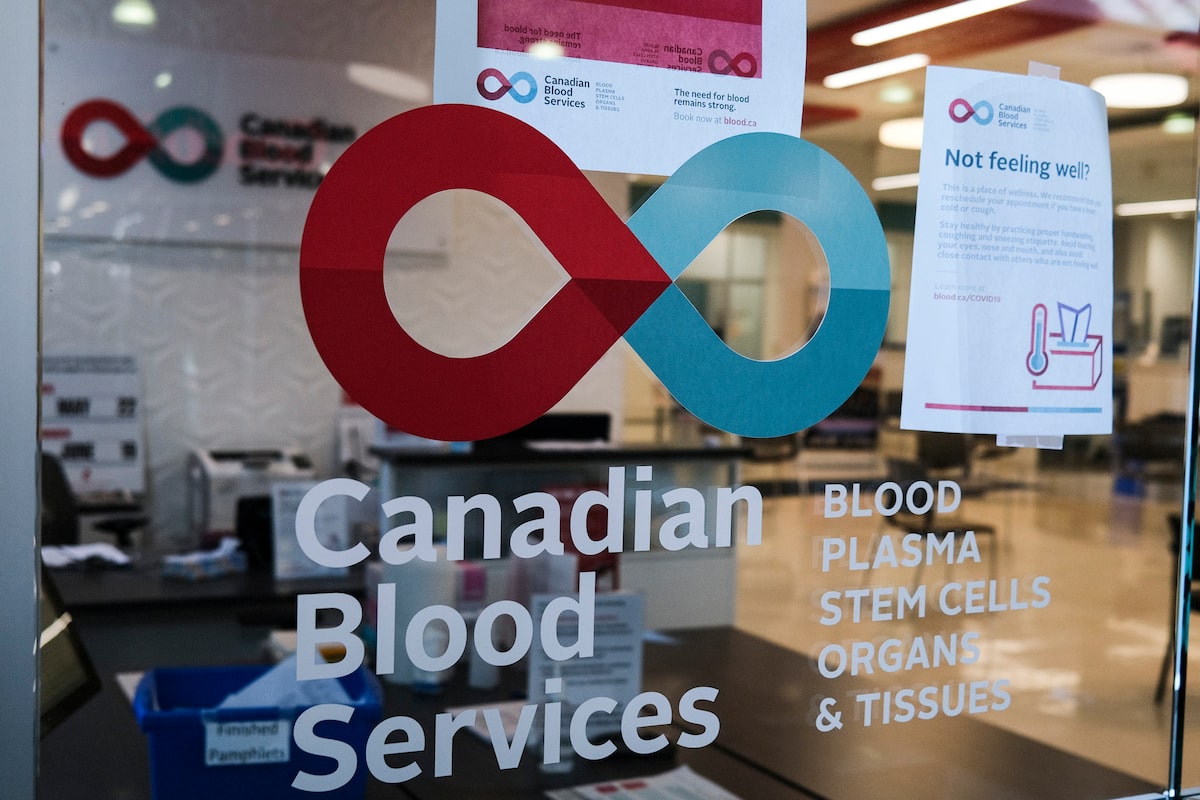Since signing the partnership with Grifols a long-time supplier of plasma-derived products, Canadian Blood Services says it has boosted domestic supply of immunoglobulin to 27 per cent of demand from 15 per cent.Jeff McIntosh/The Canadian Press
Spanish drugmaker Grifols GIFOF is selling medicine abroad made from Canadian-donated blood plasma as part of a complex arrangement with Canadian Blood Services, despite a pledge by CBS that all blood donations would be used for products that stay in Canada.
CBS, a charity that runs the blood donation system everywhere in Canada but Quebec, announced in 2022 that it would partner with Grifols to collect blood plasma. Grifols pays donors and makes its profits by processing and reselling their plasma, while CBS was founded as a voluntary donation system.
Plasma is a straw-coloured fluid in blood used for transfusions and to make therapies such as immunoglobulin, commonly used for people with immune disorders.
Grifols currently operates 17 collection centres across Canada, most of which it acquired by buying the only other private plasma company in the country in 2023. It also bought a manufacturing facility in Montreal in 2020 that began producing pharmaceutical products earlier this year.
Hamilton rebukes Canadian Blood Services, Grifols over paying for blood plasma donations
Canadian Blood Services apologizes to LGBTQ+ groups for donation ban
When the deal with Grifols was announced, CBS said it was necessary to address immunoglobulin shortages by boosting domestic production and vowed that plasma collected in Canada would stay in Canada for Canadian patients.
“None of the plasma that will be collected through this transaction can be sold offshore,” CBS chief executive officer Graham Sher told reporters in 2022, including “none of the product made from plasma.”
However, Grifols, a publicly traded company in the United States and Spain, recently confirmed that the Montreal factory is starting to make products for sale internationally, just not immunoglobulin – yet.
“At this point, it’s only producing albumin,” Grifols CEO Nacho Abia told analysts on a July 29 earnings call. Albumin is another product used to treat low blood volume.
“The plan is in the future it will also fractionate products, and we’ll do immunoglobulins in Canada as well. And we don’t provide the specific numbers about this project, but, essentially, I think we are becoming a very solid partner with the health care system in Canada.”
Fractionation is the process of separating and processing the plasma into its component proteins, which can have different, specific uses.
CBS told The Globe and Mail that, currently, plasma collected in Canada is sent to Grifols’ manufacturing plant in Clayton, N.C., to produce immunoglobulin. “Byproducts” from that manufacturing are then shipped to Grifols’ factory in Montreal to produce albumin.
“These byproducts would otherwise be discarded as biological waste,” CBS said in an unsigned statement. “Instead, Grifols can use the byproducts to create albumin which will help patients in other countries, as Canada’s needs for these medicines are already being met.”
CBS said it is selling these byproducts to Grifols and that the proceeds offset some of the cost of paying the company to manufacture immunoglobulin.
The agency said that, since signing the partnership with Grifols, it has boosted the domestic supply of immunoglobulin to 27 per cent of demand, from 15 per cent. It attributes 8 per cent of that increase to Grifols and 4 per cent to its own efforts, which include a network of 11 plasma collection centres.
Grifols has been a long-time supplier of plasma-derived products. CBS had also contracted the company to provide advice on collection strategy before it signed the partnership in 2022.
Grifols declined to answer most of The Globe’s questions but said its “centres continue to grow their donor base and collections.”
Plasma therapies make up an enormous share of CBS’s annual budget. It spent $913-million on “plasma protein and related products” last year, according to its 2024 annual report, about 60 per cent of its expenses that year. Nearly all its revenue comes from provincial and territorial governments.
Paying for blood donations is barred in three provinces: British Columbia, Ontario and Quebec.
The Ontario government has allowed Grifols to set up shop in the province despite the ban because of its association with CBS. Hamilton City Council unanimously voted to rebuke paid plasma collection in their municipality last year, although that did not stop Grifols from setting up a centre in the city.
The Ontario Ministry of Health said it was monitoring CBS’s operations. “We expect Canadian Blood Services to prioritize the needs of Canadian patients first and foremost,” ministry spokesperson Jackson Jacobs said.
NDP MPP France Gélinas, her party’s health critic, said Ontario was allowing a private company to profit from blood plasma donations.
“People have to have trust in our health care system,” she said. “You allow things like this to happen, you erode trust in the health care system.”

